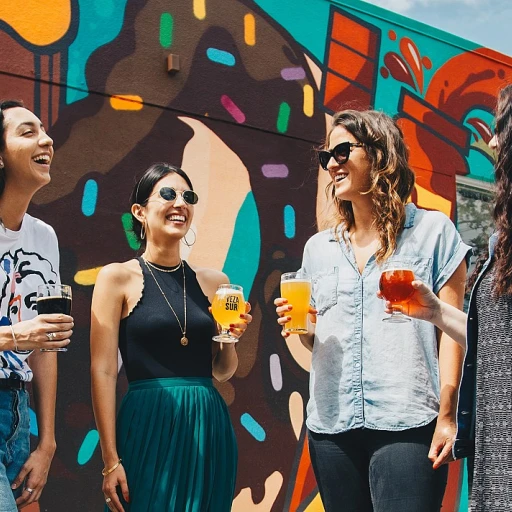
The Rise of Influencer Marketing
The Evolution of Influencer Marketing
In recent years, influencer marketing has emerged as a powerful tool in the advertising arsenal of brands worldwide. This shift has been driven by the growing influence of social media platforms, where influencers—individuals with significant followings—can sway the purchasing decisions of their audience. As brands seek to leverage this influence, they must navigate the complex dynamics of paid and organic strategies.
Influencer marketing is not just about reaching a broad audience; it's about engaging with the right audience. Brands are increasingly recognizing the value of authentic connections that influencers can create with their followers. This authenticity is often more impactful than traditional advertising methods, making influencer marketing a key component of modern marketing strategies.
As the landscape evolves, the demand for skilled professionals in influencer marketing roles is on the rise. These roles require a deep understanding of both paid and organic strategies, as well as the ability to craft compelling content that resonates with target audiences. For those looking to enhance their skills in this area, exploring online resources can be a valuable step.
Understanding the nuances between paid and organic influencer marketing is crucial for brands aiming to maximize their reach and impact. While paid strategies offer immediate visibility, organic approaches can foster long-term relationships with audiences. As we delve deeper into the pros and cons of each approach, it becomes clear that a balanced strategy often yields the best results.
Paid Influencer Marketing: Pros and Cons
Paid Influencer Marketing: Advantages and Drawbacks
Paid influencer marketing represents a strategic approach that brands utilize to enhance their visibility and spark engagement within their target audience. Here’s a breakdown of the key benefits and potential drawbacks this method entails.- Immediate Reach and Engagement: Brands can leverage paid strategies to quickly reach a defined audience through media influencers who have established followings. This can result in immediate boosts to campaigns, making it an appealing aspect of marketing strategy. Paid social media campaigns are often seen as reliable vehicles for increasing brand awareness.
- Content Control and Usage Rights: Engaging in paid media means that brands generally have more control over influencer content. Usage rights are often established upfront, allowing brands to repurpose the influencer content across different advertising channels without facing legal hurdles related to the usage rights.
- Measurable ROI: With paid advertising, brands can clearly define and measure their return on investment through specific metrics. This facilitates a more precise evaluation of how influencer marketing contributes to broader advertising goals.
- Cost: Paid campaigns can be expensive, as influencers charge varying rates depending on their reach and engagement levels. This may limit smaller brands' abilities to employ paid social strategies.
- Authenticity Concerns: As audiences become more discerning, they may view paid posts as less authentic compared to organic content. This can potentially impact audience trust, which is vital for effective influencer marketing.
- Regulatory Compliance: Ensuring that all paid social media content complies with advertising regulations requires diligent oversight. Brands need to make sure their campaigns adhere to legal standards, which can be complex and time-consuming.
Organic Influencer Marketing: Pros and Cons
Organic Routes in Influencer Marketing
While paid influencer marketing often grabs the headlines due to its concise execution and direct nature, the charm and authenticity attached to organic influencer marketing should not be underestimated. This approach leans on the natural growth and genuine interactions that influencers can offer to a brand's audience through their social media presence without direct financial compensation.
One of the primary advantages of organic influencer marketing is its potential to build trust and credibility among followers. Organic content crafted by influencers is perceived as more genuine. This perception is vital in today's market, where authenticity is a highly valued currency. The influencer-brand relationship is deepened when the influencers genuinely believe in the brands they promote, fostering a brand loyalty that resonates authentically with their followers.
However, the organic route does come with its challenges. The most significant being the unpredictable nature of its reach and engagement. Unlike its paid counterpart, results aren't guaranteed. The impact relies heavily on the influencer's established trust and the alignment with their followers' interests and needs. This can make it difficult for brands to forecast results and allocate budgets effectively, echoing concerns similar to those found in paid media advertising strategies.
Moreover, without any financial transactions, there could be potential issues regarding usage rights of influencer-generated content. Brands must navigate the dynamics of content ownership and ensure clear agreements about how usage rights are structured between the influencers and the brands.
In an evolving landscape where both organic posts and structured paid strategies coexist, understanding the subtleties of the organic approach offers valuable insights into the equilibrium that brands must achieve. Whether aiming to tap into authentic content or navigating the impact on hiring practices for influencer marketing roles, a comprehensive understanding of these dynamics is crucial.
Impact on Hiring Practices
The Evolving Impact on Recruitment Practices
In recent years, the rise of influencer marketing has significantly altered hiring practices across various industries. Brands are increasingly relying on a mix of paid and organic strategies to expand their reach and engage with their target audience through media influencers. This shift has necessitated changes in the way companies approach their recruitment strategies for influencer marketing roles. The integration of paid social and organic influencer campaigns has led to a demand for professionals who can effectively navigate these dual channels. Candidates with expertise in both paid and organic marketing strategies are becoming more desirable. Companies are seeking individuals who possess the ability to craft compelling influencer content and manage the complexities of usage rights and media strategies. Moreover, the need for a strategic approach to both paid advertising and organic social media campaigns has driven organizations to prioritize candidates with a robust understanding of social media dynamics. The capacity to measure the success of influencer campaigns, through analytics and metrics, is another crucial skill that is being prioritized during hiring. Overall, as influencer marketing continues to grow in prominence, the impact on hiring practices will likely expand, with roles increasingly focusing on candidates who can blend creativity with a strategic mindset. These dynamics underscore the importance of developing a comprehensive marketing strategy that leverages both organic and paid media, aligning with the evolving landscape of modern branding objectives.Skills in Demand for Influencer Marketing Roles
Essential Skills for Influencer Marketing Roles
In the evolving landscape of influencer marketing, the demand for specific skills is on the rise. As brands increasingly leverage both paid and organic strategies, professionals in this field must be equipped with a diverse skill set to effectively manage campaigns and engage target audiences.
- Content Creation and Strategy: Crafting compelling content is at the heart of influencer marketing. Professionals need to understand how to create engaging posts that resonate with audiences, whether through organic social media or paid advertising. This includes knowledge of content usage rights and the ability to tailor content to different platforms.
- Social Media Expertise: A deep understanding of social media platforms is crucial. This includes knowing how to optimize posts for reach and engagement, as well as staying updated on the latest trends and algorithms that affect both paid and organic reach.
- Analytical Skills: The ability to analyze campaign performance and audience data is essential. Professionals must be able to interpret metrics to refine strategies and demonstrate the impact of influencer campaigns on brand objectives.
- Negotiation and Relationship Management: Building and maintaining relationships with influencers is key. This involves negotiating terms, managing usage rights, and ensuring that influencers align with the brand’s values and goals.
- Creative Thinking: As the market becomes more saturated, creativity sets successful campaigns apart. Professionals need to develop innovative strategies that capture attention and differentiate the brand from competitors.
As the industry continues to grow, these skills will remain in high demand, shaping the future of influencer marketing and the hiring practices associated with it.
Future Trends in Influencer Marketing and Hiring
Anticipating the Evolution of Influencer Marketing
In the ever-changing landscape of influencer marketing, there is a growing emphasis on building authentic relationships between brands and influencers. As audiences become more savvy, the demand for genuine, organic engagement is expected to rise. Brands will likely prioritize influencers who can authentically connect with their audience, leading to more sustainable and long-term partnerships. Moreover, as social media platforms experience continuous evolution, the strategies employed by paid and organic influencers will need to adapt accordingly. With the integration of new features and advertising opportunities, influencers must refine their approach to optimize content delivery and expand their reach.- Increased Demand for Analytical Skills: As data-driven insights become more accessible, the ability to analyze campaign performance will be vital. Influencers with a strong grasp of analytics can help brands make informed decisions regarding media strategy and paid advertising.
- Emphasis on Multi-Platform Reach: The fluid nature of social media necessitates a diverse presence across platforms. Influencers who excel at tailoring content for various channels will have a competitive edge, allowing them to engage with a wider audience effectively.
- Understanding of Usage Rights: An increasing number of brands are focusing on the usage rights associated with influencer content. Those who can navigate these complexities will remain in high demand, as brands aim to maximize the value of their media usage.
- Enhanced Collaboration Tools: With technology advancements, collaboration between influencers and brands is likely to become more streamlined. Tools that facilitate efficient communication and content management will drive the success of advertising campaigns.













